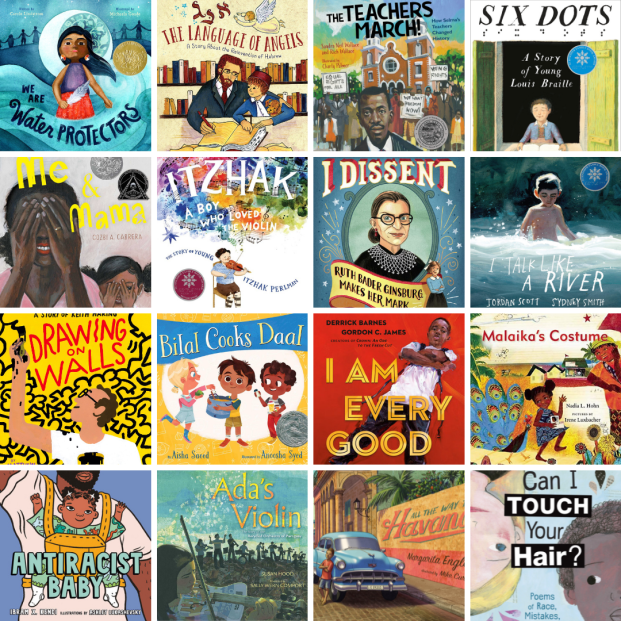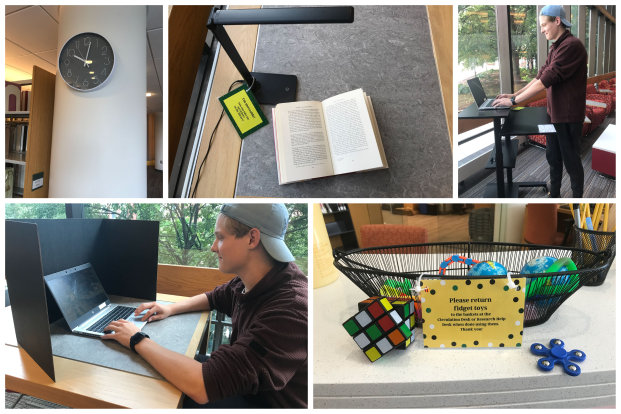
Diversity, Equity, and Inclusion
Diversity, Equity, and Inclusion Initiatives
Library Diversity, Equity, and Inclusion (DEI) Committee
Library DEI Committee Charge
Library Diversity, Equity, & Inclusion Plan
2024-2025 Library DEI Team Members: Olivia Rossetti (Chair), Renée Fratantonio, Asher Jackson, Kim Smalley, and Lori Steckervetz,
In a public response to the 2020 murders of George Floyd and Breonna Taylor, the Library issued a public statement of solidarity with the BLM protests, as well as a commitment of action to addressing systemic and institutional racism both within the Library and across campus. In order to ensure that the Library follows through on this commitment, the Library Anti-Racism Committee was created at the end of FY2020. The committee is comprised of a group of volunteers that include both librarians and library staff.
In fall 2022, the committee's name was changed to the Diversity, Equity, and Inclusion Committee, and its charge updated appropriately. While still centering its anti-racist goals, this name change recognizes the intersectionality of oppressions, and our commitment to ending all systemic oppressions.
Over the course of FY21 the team developed a Library Diversity, Equity and Inclusion (DEI) plan. The Library DEI plan focuses on 5 areas of Library operations: Staff Professional Development, Collections & Systems, and Programming & Outreach, Policies & Procedures, Library User Data Gathering & Assessment.
The Library has begun implementation of the Library Diversity, Equity, & Inclusion Plan with a collection development pilot project to "identify gaps and fill gaps in the existing collection for diverse representation in both topics and authors" in the Children's Literature collection. This project has resulted in the purchase and inclusion of over 198 new titles to increase diverse representation in the Library’s picture book collection.
In spring 2023, the Library successfully hosted a DEI facilitator to run a day-long training for all full-time and part-time employees. The session was paid for with an award from a 2022 Academic Innovation Fund grant, with the goal of creating a baseline understanding of implicit bias, cultural competencies, and microaggressions for Library employees. This training will serve as a baseline for future professional development looking specifically at how intersecting layers of oppression may be at play in our daily library work.
DEI Focused Online Guides
The Library collaborated with a number of units across campus to bring together multiple diversity, equity and inclusion initiatives and support them with curated resources:
- Diversity, Equity and Inclusion
- fitchburgstate.libguides.com/DEI
- This guide serves as a landing page/portal to link users to other the following: Leading for Change, Anti-Racism resources, Understanding Land and Labor Acknowledgements, definitions language to support the new University strategic plan, and library resources.
- Leading for Change
- fitchburgstate.libguides.com/LeadingForChange
- This guide was created to give a central shared repository of resources, available from on and off campus.
- Understanding Land and Labor Acknowledgements
- fitchburgstate.libguides.com/Fitchburg-State-land-labor-acknowledgements
- This guide provides information to order to support the new practice of land and labor acknowledgements for campus events
- Anti-Racism Guide
- fitchburgstate.libguides.com/anti-racism
- To help support the Fitchburg State community in learning more about systemic racism, as well as anti-racism practices and tools to enable the dismantling of racist systems, the Library has created and continues to update and expand an Anti-Racism Guide.
Project A+: Supporting Neurodiverse Students in the Library
Project A+ Team Members: Sherry Packard, Kim Smalley, and Connie Strittmatter
The Library's Project A+ team meets regularly to investigate and develop new approaches to serving neurodiverse students. Using Florida State University’s Project A+: Serving Students with Autism Spectrum Disorder in the Academic Library as a guide, the team has worked with library staff to make changes to the library environment in order to create a more inclusive environment that seeks to meet the needs of neurodiverse students.
Changes to the library space include:
- Additional lighting options - Rolling/moveable lamps and table lamps are now available through out the library's 4 floors.
- Privacy panels - these simple cardboard table top screens are scattered through out the Library. Students should feel free to move them to whatever table they want to use in order to help reduce distractions
- Movable standing desks - adjustable desks that can be moved anywhere in the library space so that students who prefer to stand while working can do so comfortably in the space of their choosing
- Quiet clocks - non-ticking wall clocks have been added to floors 2-4. If a student is sitting near the clock they will not be distracted by any ticking sounds, but may also find that it can be less distracting to glance at a clock instead of picking up a phone to check the time.
- Fidget toys - these are self-regulation tools that can help with maintaining focus and attention. Located in baskets at both the Research Help Desk and Public Services Desk, students are invited to borrow any fidget toys while in the Library.
- Noise cancelling headphones - while the 3rd and 4th floors of the Library are designated as Quiet Study spaces, noise cancelling headphones can help students who are sensitive to ambient noises. Stop by the Public Services Desk by the Library entrance on the first floor to check out a pair.
In addition to the environmental changes and tools, the Project A+ team also implemented an Alternative Communication Strategies training module which Library Student Employees completed in March 2021. To evaluate the effectiveness of the training, the Project A+ team interviewed the student employees to solicit their feedback on what parts of the training were effective and areas that can be improved. The team is currently working on revisions to the training modules with Alternative Communication Strategies 2.0 Training to be released Spring 2025.
Oral History Project: Building Representation for Underrepresented Voices
Oral History Project Members: Olivia Rossetti (project lead), Ahenebah Lane, and Asher Jackson
The Building Representation for Underrepresented Voices in the Archival Collections oral history project launched in FY2022 with the goal of creating an archival collection dedicated to documenting the experiences of students of color who attended Fitchburg State University. In collaboration with the Alumni Office, as well as current faculty, we performed outreach to past and current students to contribute to this pilot phase of the project. With a $2,000 award from the University Deans’ Anti-Racism Fund, the Library hired Ahenebah Lane, an independent public historian specializing in oral history, to conduct and transcribe the interviews.
By the end of the funding period, the team completed five oral histories–four with alumni, and one with a graduating senior. A second grant of $3,000 from the Deans' Anti-Racism Fund has allowed the project to continue into FY2023. It is essential to continue this work moving forward, to continue to offer prominent representation to students of color in our Archives, which we have historically lacked.

